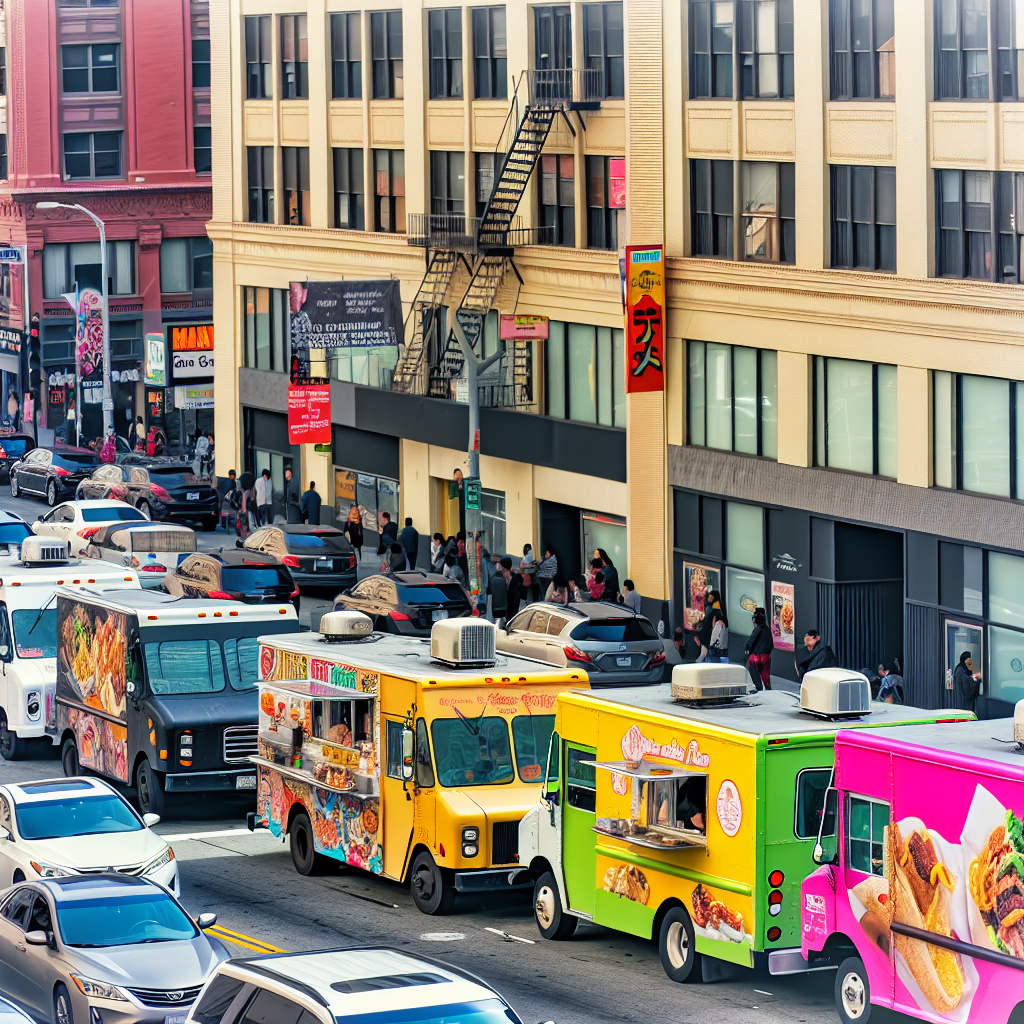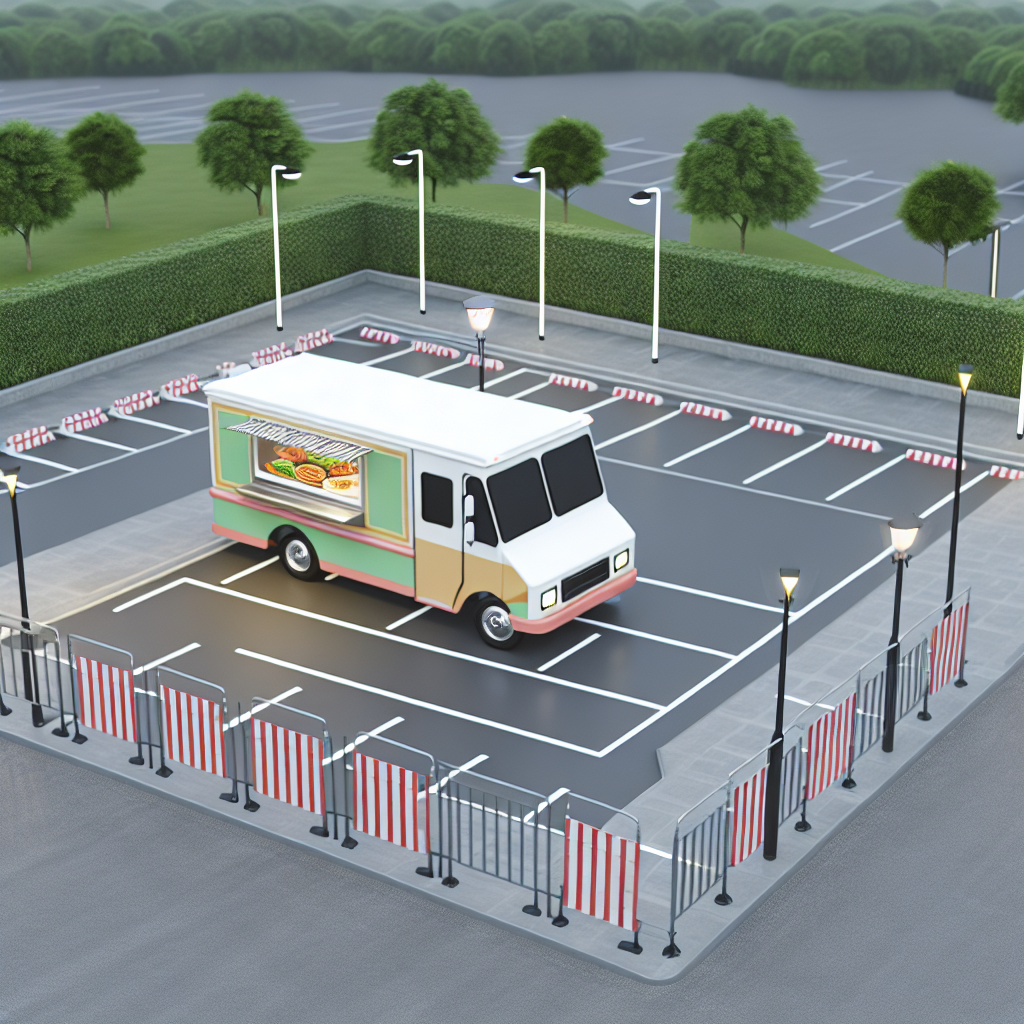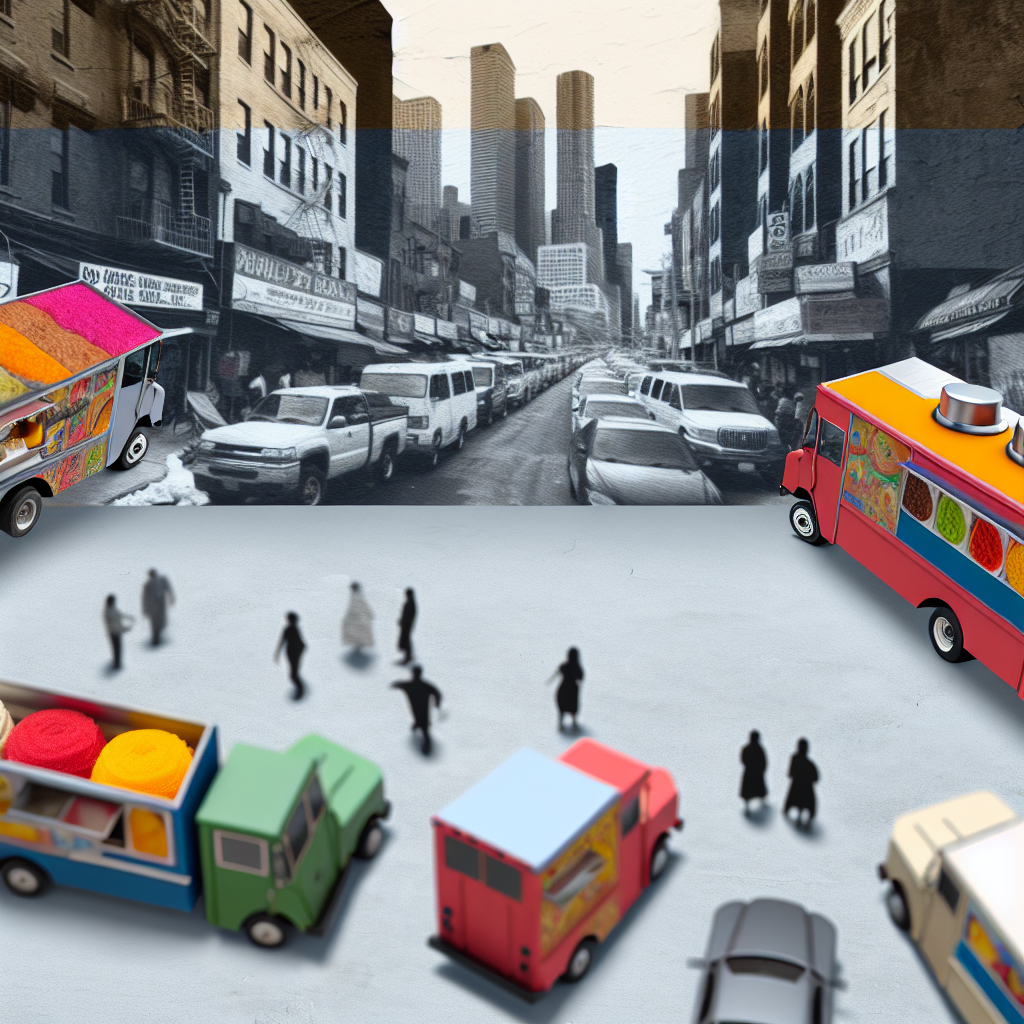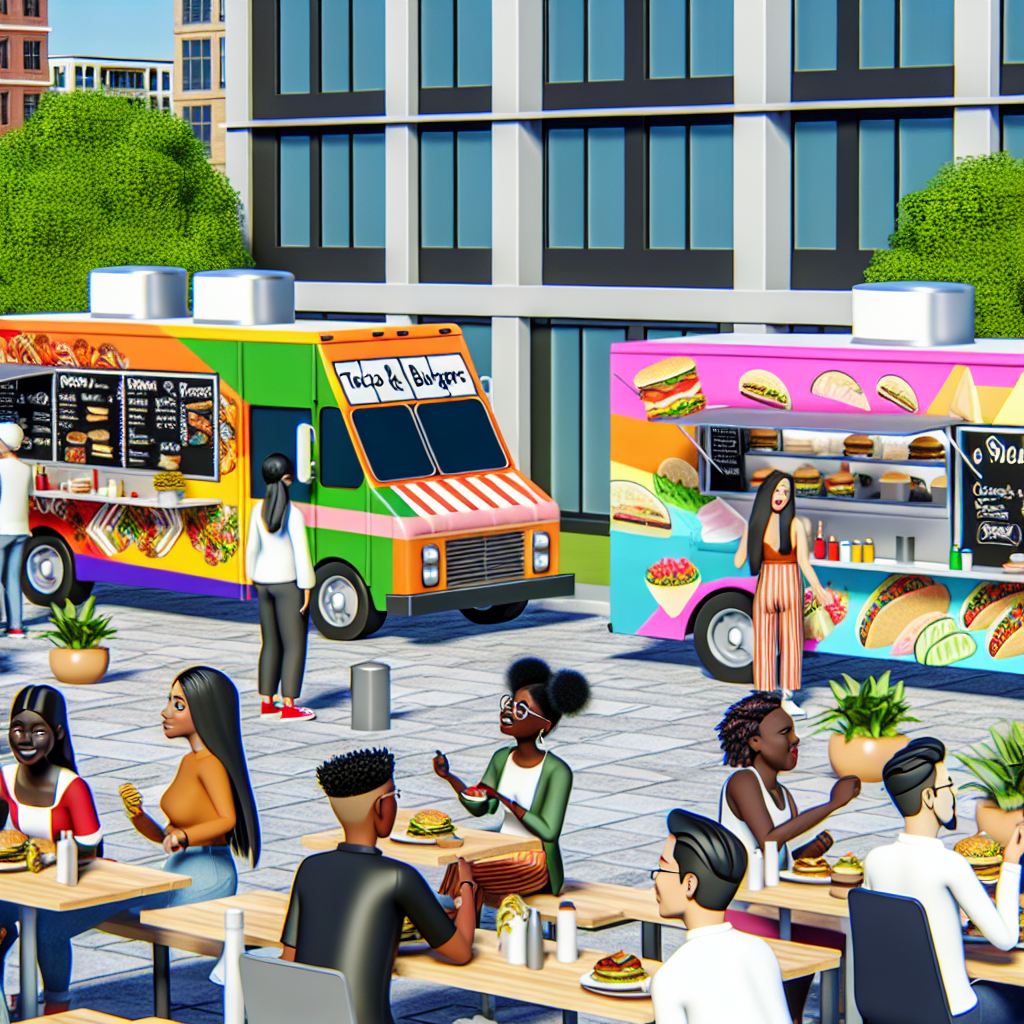For mobile food businesses, finding a suitable parking spot is often a high-stakes game that can spell the difference between success and struggle. Imagine a food truck owner, buzzing with excitement and ready to serve delicious meals, but facing the daunting reality of scarce parking spaces in vibrant city streets. The emotional toll of worry and frustration amplifies as their potential customers circle nearby, unable to enjoy a culinary experience due to a lack of legal parking. These challenges not only put pressure on their daily operations but also jeopardize their aspirations of establishing a thriving business. However, innovative solutions like Freight Ninja are stepping in to ease these burdens, creating safe and secure parking networks tailored to meet the needs of food truck operators. As owners adapt to the evolving landscape, the conversation continues around the critical link between parking accessibility and culinary success on wheels.
Insight: Parking Challenges for Food Businesses
Parking presents numerous significant challenges for mobile food vendors, which can severely impact their operational efficiency and customer reach. The absence of dedicated parking spots is one of the most prevalent issues. Many cities lack designated areas where food trucks can park legally, forcing vendors to search for street parking amid competing vehicles. Imagine a food truck owner scanning busy downtown streets, only to find that nearby residents and commuters occupy any available space. This lack of designated parking not only wastes valuable time but can also lead to missed opportunities for customers looking for a quick meal.
Safety concerns further complicate the parking situation for food vendors. Due to the unpredictable nature of finding a suitable spot, many food trucks are forced to park in poorly lit areas or in neighborhoods where theft and vandalism are more likely. For instance, a vendor might return to their truck after serving lunch only to find that their equipment or supplies have been stolen, leading to a setback in service and increased costs. These safety issues not only discourage food vendors from working late hours but also create anxiety about their investments and livelihoods.
Competition for space intensifies the pressure. Vendors often jockey for the same spots that other food trucks and regular vehicles target. Picture a food truck pulling up to a lucrative corner, only to find rival vendors already established and serving customers. This competition not only reduces potential sales for everyone but can also result in heated exchanges and frustration among vendors trying to establish their daily routines. As they vie for the same small pockets of space, relationships between food truck operators can become strained, making a collaborative environment challenging.
In summary, the parking challenges faced by mobile food businesses are multifaceted, encompassing the lack of designated zones, safety concerns, and intense competition with other vehicles. These factors not only hinder daily operations but also take an emotional toll on food vendors striving to bring their culinary creations to the streets. Addressing these issues is crucial for enabling mobile food businesses to thrive in urban landscapes.



This image depicts a crowded cityscape showcasing food trucks struggling to find parking, emphasizing the tight urban parking conditions that food vendors often face, resonating emotionally with the audience.

This image illustrates a food truck parked securely in a well-lit, fenced parking lot, demonstrating the safe environment that Freight Ninja offers for food vendors.
Insight: Parking Challenges for Food Businesses
Parking presents numerous significant challenges for mobile food vendors, which can severely impact their operational efficiency and customer reach. The absence of dedicated parking spots is one of the most prevalent issues. Many cities lack designated areas where food trucks can park legally, forcing vendors to search for street parking amid competing vehicles. Imagine a food truck owner scanning busy downtown streets, only to find that nearby residents and commuters occupy any available space. This lack of designated parking not only wastes valuable time but can also lead to missed opportunities for customers looking for a quick meal.
Safety concerns further complicate the parking situation for food vendors. Due to the unpredictable nature of finding a suitable spot, many food trucks are forced to park in poorly lit areas or in neighborhoods where theft and vandalism are more likely. For instance, a vendor might return to their truck after serving lunch only to find that their equipment or supplies have been stolen, leading to a setback in service and increased costs. These safety issues not only discourage food vendors from working late hours but also create anxiety about their investments and livelihoods.
Competition for space intensifies the pressure. Vendors often jockey for the same spots that other food trucks and regular vehicles target. Picture a food truck pulling up to a lucrative corner, only to find rival vendors already established and serving customers. This competition not only reduces potential sales for everyone but can also result in heated exchanges and frustration among vendors trying to establish their daily routines. As they vie for the same small pockets of space, relationships between food truck operators can become strained, making a collaborative environment challenging.
In summary, the parking challenges faced by mobile food businesses are multifaceted, encompassing the lack of designated zones, safety concerns, and intense competition with other vehicles. These factors not only hinder daily operations but also take an emotional toll on food vendors striving to bring their culinary creations to the streets. Addressing these issues is crucial for enabling mobile food businesses to thrive in urban landscapes.
Statistics on Food Truck Parking Shortages
Recent studies and surveys highlight significant parking challenges faced by food trucks and mobile vendors in various U.S. cities:
-
Chicago’s Regulatory Constraints on Food Trucks
Source: Illinois Policy Institute
Date: March 27, 2018
A study revealed that Chicago’s stringent regulations severely limit food truck operations. Proximity laws prohibit food trucks from operating within 200 feet of any establishment selling food, including restaurants and grocery stores. This restriction confines legal operations to just 3% of Chicago’s downtown Loop area. Additionally, food truck operators are required to install GPS tracking devices and maintain detailed records, adding to operational burdens.
illinoispolicy.org -
Long Beach’s Initiative to Address Food Truck Parking Issues
Source: City of Long Beach
Date: March 10, 2023
Recognizing the challenges faced by food truck operators, the City of Long Beach launched a survey to gather community input on food truck operations, including parking concerns. The initiative aims to inform new citywide regulations that balance entrepreneurial opportunities with the needs of residents and businesses.
longbeach.gov -
Washington State’s Food Truck Parking Challenges
Source: Washington State Food Truck Association
The association highlights that as food truck popularity grows, city governments across Washington are updating regulations. Some cities have implemented restrictive codes, often influenced by concerns from brick-and-mortar restaurant owners about competition. These regulations can limit operational areas and parking availability for food trucks.
wafoodtrucks.org -
New York City’s Street Vendor Parking Difficulties
Source: City Journal
Food truck operators in New York City face significant challenges due to complex regulations and intense competition for prime parking spots. Vendors often receive numerous violations for infractions such as parking too close to sidewalks, with penalties reaching up to $385 per violation. The competitive environment and regulatory burdens make securing suitable parking a persistent issue.
city-journal.org
These findings underscore the widespread parking challenges that food trucks and mobile vendors encounter, often exacerbated by local regulations and competition with established businesses.
Solutions Provided by Freight Ninja
Freight Ninja offers tailored solutions for food truck operators. They address the critical challenges of secure parking and location accessibility through their paid truck parking network. With a growing number of facilities nationwide, they provide a reliable resource for mobile food businesses.
Security Features
To ensure the safety of vehicles and equipment, Freight Ninja implements robust security measures. This allows operators to focus on their culinary offerings. Key features include:
- 24/7 Surveillance: Enhanced monitoring helps deter incidents of theft or vandalism.
- Perimeter Fencing: Facilities are enclosed with strong fencing to improve security.
- Automated Security Gates: Access-controlled gates enhance protection.
- LED Lighting: Well-lit areas improve safety during nighttime operations.
- On-Site Security Staff: Selected locations have staff available for added security.
Location Advantages
With over 50 locations near major transportation hubs and highways, Freight Ninja helps food truck operators efficiently reach their target markets. Accessibility is a key advantage, especially in busy urban areas like Chicago. Easy access to interstates facilitates convenient travel for vendors and customers alike.
Pricing Information
Freight Ninja’s pricing is clear, with monthly rates ranging from $175 to $450 based on location. This straightforward pricing structure, coupled with month-to-month agreements, allows food truck operators to budget effectively. They can adapt their parking arrangements to meet their business needs.
Utilizing Freight Ninja’s network not only provides secure parking but also enhances operational efficiency for food truck operators.
Comparison of Truck Parking Pricing and Availability by Freight Ninja
| Region | Monthly Cost | Availability of Spots | Security Features |
|---|---|---|---|
| Chicagoland, IL | $175 – $225 | Limited | 24/7 surveillance, LED lighting |
| Lombard, IL | $450 | Moderate | Automated gates, on-site staff |
| Atlanta, GA | $200 | Ample | Perimeter fencing, 24/7 surveillance |
| Dallas, TX | $215 | Limited | LED lighting, automated gates |
| Los Angeles, CA | $250 | Ample | On-site staff, 24/7 surveillance |
| Seattle, WA | $230 | Moderate | Perimeter fencing, LED lighting |
This table helps you quickly assess the options for truck parking across different regions, considering both pricing and availability of spots, along with key security features offered by Freight Ninja.
The following table provides a comprehensive comparison of truck parking options available through Freight Ninja, detailing monthly costs, availability of spots, and key security features across various regions. This information is designed to help food truck operators make informed decisions about parking solutions that cater to their specific needs.
Conclusion: Practical Tips for Overcoming Food Truck Parking Challenges
Navigating the world of mobile food service can be challenging, particularly when it comes to securing proper parking. Here are some actionable tips for food truck operators aiming to overcome parking challenges effectively:
- Research Local Regulations: Before selecting a location, familiarize yourself with local parking regulations. This knowledge can help avoid costly fines and ensure compliance with operational limits.
- Utilize Paid Parking Networks: Consider joining a paid parking network such as Freight Ninja. Their secured locations offer peace of mind and reliability, allowing you to focus on serving customers rather than searching for legal parking spots.
- Plan Ahead: Use apps and online tools to identify potential parking options in advance. By researching available spaces and understanding peak times, you can save time and avoid frustration while parking.
- Cultivate Relationships with Local Businesses: Establishing partnerships with nearby businesses can lead to mutually beneficial arrangements, such as permission to park on their property. Cultivating strong community ties fosters good will and can pave the way for steady clientele.
- Optimize Parking Duration: Consider the busiest hours for your target audience. Parking for shorter durations during peak hours allows flexibility to move your truck as needed, increasing visibility among potential customers.
- Leverage Technology: Use GPS and mapping tools to streamline your route to pre-reserved parking spots. This eliminates last-minute parking scrambles and enhances overall efficiency during service hours.
- Communicate with Fellow Vendors: Maintaining open lines of communication with other food truck operators may lead to shared knowledge about the best parking locations and times, helping you collaborate instead of compete.
In conclusion, while parking challenges are indeed significant for food truck operators, employing these strategies can help in overcoming them. By utilizing networks like Freight Ninja, doing thorough research, and establishing community partnerships, food truck operators can enhance their chances of success in the bustling food industry.


